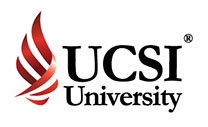| Exam Body | Internal Degree, Malaysia | ||||||||||||
|---|---|---|---|---|---|---|---|---|---|---|---|---|---|
| Course Duration | 3 Yrs | ||||||||||||
| Part Time/Full Time | Full Time | ||||||||||||
| Fees | 75960/Course | ||||||||||||
| Fees (International Student) | 81510/Course | ||||||||||||
| Campus | UCSI University, Kuala Lumpur Campus | ||||||||||||
| Faculty | Faculty of Engineering, Technology & Built Environment | ||||||||||||
| Conducted entirely in Malaysia | Yes | ||||||||||||
| Awarding Country | Malaysia | ||||||||||||
| Level of Study | Bachelor's Degree Level | ||||||||||||
| Field of Study | Engineering & Engineering Trades | ||||||||||||
| Course Description |
| ||||||||||||
| Curriculum |
| ||||||||||||
| Entry Requirements | For Engineering degree: STPM Minimum 2C including Mathematics and Physics ‘A’ Levels Minimum 2D including Mathematics and Physics UEC Minimum 5 credits, including Mathematics and Physics CPU CPU – Minimum average of 60% in 6 subjects, incl. of a minimum score of 60% in Mathematics and Physics Local Matriculation Minimum CGPA 2.0 Foundation from other University/ College Minimum CGPA 2.0 WAEC/NECO Maximum aggregate of 15 points out of best 5 subjects, inclusive of minimum B’s in Mathematics and Physics Diploma/ Advance Diploma/ Degree/ equivalent Pass (Subject to School discretion after reviewing transcript & syllabus. Max credit transfer of 30%) Other qualifications deemed equivalent to STPM/A-Level by MQA Minimum overall average of 65%, inclusive of minimum 65% in Mathematics and Physics International Baccalaureate Minimum 26/42 points from 6 subjects (Minimum scores of 4/7 in Mathematics & Physics) SAM SAM – Minimum average of 65% in 5 subjects, incl of minimum scores of 65% in Mathematics and Physics *Chemistry is required for Chemical Engineering; Physics is required for all other programmes. For Engineering Diploma, Interior Architecture and Architecture programmes, please refer to http://www.ucsiuniversity.edu.my/foetbe/ for more details. | ||||||||||||
| Intake Months | April, September, December | ||||||||||||
| Career Prospects |
|
All fees are in RM (Ringgit Malaysia) currency unless stated otherwise.
Other Courses in this Level of Study Other Courses in this Field of Study

























